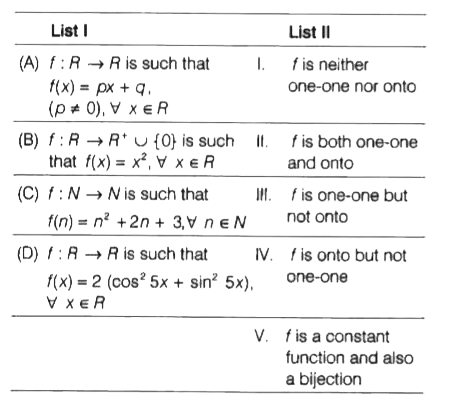If zn=(1+i√2)n,n∈Z, then 19Re(z4¯z5)=Solution in Telugu
81
27
9
3
The correct Answer is:C
Step by step video, text & image solution for If z_(n)=(1+isqrt(2))^(n), n in Z, then 1/9 R e (z_(4) bar(z)_(5))= by Maths experts to help you in doubts & scoring excellent marks in Class 12 exams.
Updated on:21/07/2023Topper's Solved these Questions
Similar Questions
If f:R→R,g:R→R are defined by f(x)=5x−3,g(x)=x2+3, then (gof−1)(3)=
View SolutionMatch the following

The correct answer is
View SolutionLet |((¯z1)−2(¯z2))/(2−z1(¯z2))|=1 and |z2|≠1,where z1 and z2 are complex numbers. Show that |z1|=2.
View SolutionLet z1z2,z3zn be the complex numbers such that |z1|=|z2||zn|=1. If z=(n∑k=1zk)(n∑k=11zk) then proves that z is a real number 0<z≤n2
View SolutionIf arg(Z_(1)Z_(2))=arg Z_(1)+arg Z_(2)+n pi,n in Z and ifprinciple argument of Z in[-pi,pi) then Z_(1)=-2,Z_(2)=-3 then n=
View SolutionIf z_(1),z_(2).........z_(n)=z, then arg z_(1)+arg z_(2)+......+argz_(n) and arg z differ by a
View SolutionProperties of a complex no. If z;z1;z2 are complex no.; then (vii)¯¯¯¯¯¯¯¯¯¯¯¯z1+z2=¯z2+¯z1 (viii)¯¯¯¯¯¯¯¯¯¯¯¯z1−z2=¯z1−¯z2 (ix)¯¯¯¯¯¯¯z1z2=¯z1¯z2 (x) ¯z1z2=¯z1¯z2 where z2≠0
View SolutionIf Z1.Z2,.....Zn lie on the circle |z|=2 then the value of |z1+z2+....+zn|−4∣∣∣1z1+1z2+....+1zn∣∣∣=
View SolutionIf z1,z2,……………,zn lie on the circle |z|=R, then
|z1+z2+…………….+zn|−R2∣∣∣1z1+1z2+…….+1z−(n)∣∣∣ is equal to
View SolutionStatement-1, If z1,z2,z3,……………….,zn are uni-modular complex numbers, then
|z1+z+(2)+…………+zn|=∣∣∣1z1+1z2+…………..+1zn∣∣∣
Statement-2: For any complex number z, z¯z=|z|2
View SolutionIf |z1|=|z2|=………….=|z−(n)|=1, then the value of |z1+z2+………+zn|, is
View SolutionIf zn=cosnπ3+isinnπ3,thenz1,z2….Z6 is
View Solutionयदि |z1|=|z2|=…….=|zn|=1,तो दर्शाइए कि
|z1+z2+….+zn|=∣∣∣1z1+1z2+…..+1zn∣∣∣.
View SolutionIf z_(1),z_(2),z_(3),…,z_(n-1) are the roots of the equation z^(n-1)+z^(n-2)+z^(n-3)+…+z+1=0 , where n in N, n gt 2 and omega is the cube root of unity, then
View SolutionIf z=z1z2z3….....zn prove that argz−(argz1+argz2+….........+argzn)=2nπ1n∈I.
View Solution
